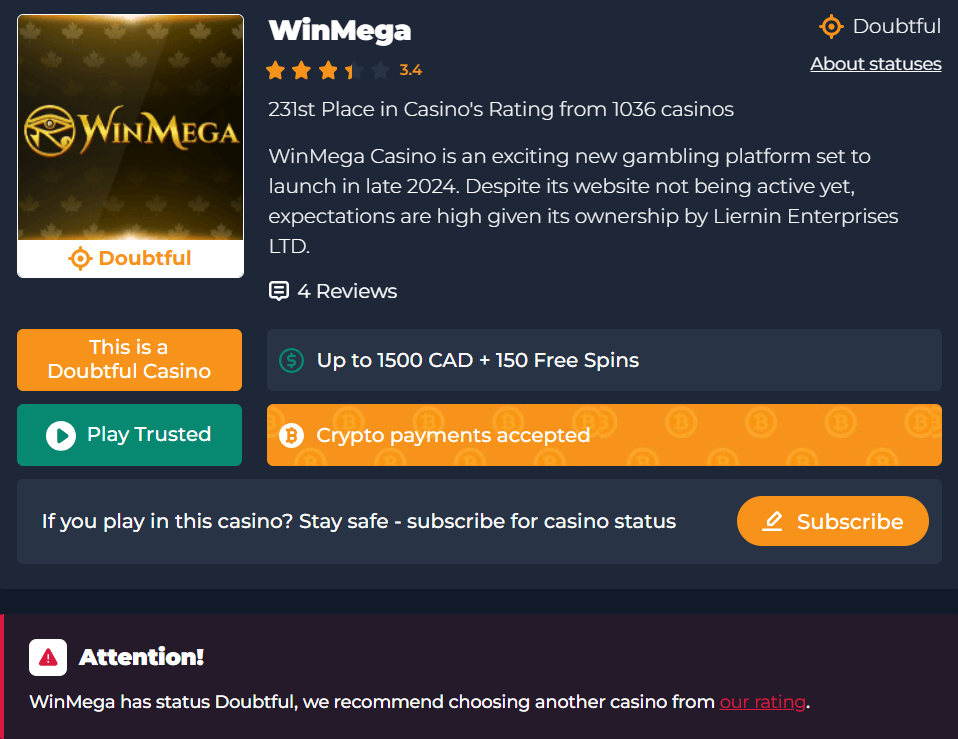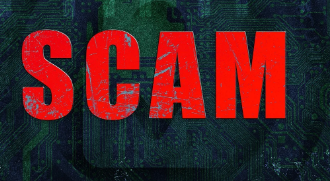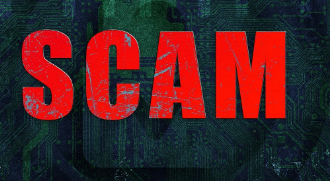Introduction
WinMega Casino, an online gambling platform that has sparked curiosity, controversy, and concern across digital corridors. With whispers of undisclosed business ties, scam reports, and potential anti-money laundering (AML) red flags, we’ve embarked on a mission to peel back the layers of this enigmatic entity. What we’ve found is a tangled web of associations, allegations, and risks that demand scrutiny. Join us as we explore WinMega Casino’s business relations, personal profiles, open-source intelligence (OSINT), scam reports, legal entanglements, and the reputational shadows it casts.

The Genesis of WinMega Casino: What We Know
WinMega Casino emerged on the online gambling scene with promises of mega wins and a seamless gaming experience. Marketed as a haven for slot enthusiasts and high-stakes players, it boasts a sleek interface, generous bonuses, and a vast array of games. But beneath the glitz, we find scant foundational details. Unlike established operators like MGM Resorts or MegaCasino, WinMega’s origins are murky. Our initial probes reveal no clear registration date, headquarters location, or licensing authority prominently displayed—a red flag in an industry where transparency is a cornerstone of trust.
We turned to open-source intelligence (OSINT) to piece together the puzzle. Social media mentions and gambling forums suggest WinMega operates as an offshore entity, possibly registered in a jurisdiction like Curacao or Malta, known for lax regulatory oversight. Yet, without official documentation, we’re left questioning: who’s behind the curtain?
Business Relations: A Network Shrouded in Mystery
Our investigation into WinMega Casino’s business relations yields more questions than answers. Legitimate casinos typically partner with reputable software providers—think NetEnt, Microgaming, or Playtech—whose games are certified for fairness. WinMega claims to offer titles from “top-tier developers,” but we couldn’t verify specific partnerships. Forum chatter hints at generic or lesser-known providers, potentially signaling rigged games, a common tactic in scam operations.
We dug deeper into payment processors, a critical artery for any online casino. WinMega accepts cryptocurrencies like Bitcoin and Tether (USDT), alongside e-wallets and credit cards. This aligns with trends in Southeast Asian scam casinos, where crypto facilitates untraceable transactions—a boon for money laundering, as noted by the UN Office on Drugs and Crime. We found no evidence of partnerships with regulated financial institutions, unlike MegaCasino’s association with PayPal, a marker of legitimacy.
Affiliate networks also play a role. WinMega’s promotional materials suggest a robust affiliate program, but the affiliates remain faceless. Are these undisclosed relationships a deliberate shield, or simply poor transparency? Our OSINT efforts uncovered no concrete ties to established gambling conglomerates, leaving us to speculate about shadowy backers.
Personal Profiles: The Faces (or Lack Thereof) Behind WinMega
Who runs WinMega Casino? We hit a wall here. No executive team, no CEO, no public-facing figures—just a void where accountability should reside. Contrast this with MGM Resorts, where leadership is documented, or even MegaCasino, which operates under SkillOnNet, a known entity. WinMega’s anonymity is a glaring red flag, echoing tactics of scam casinos in the Philippines, where operators hide to evade prosecution.
We scoured X and gambling forums for clues. Posts trending on X (as of March 25, 2025) mention WinMega in passing, but no employee or founder profiles surface. This opacity suggests either a small, rogue operation or a deliberate front for larger players. Without personal profiles, we can’t assess conflicts of interest or criminal histories—a critical gap in our risk assessment.

OSINT Insights: Piecing Together the Digital Footprint
Our OSINT dive into WinMega Casino paints a fragmented picture. The domain’s WHOIS data is privacy-protected, a common but suspicious practice. Web archives show the site’s design mimics legitimate platforms, a tactic to lure unsuspecting players. X trends reveal sporadic mentions, often tied to bonus offers, but no verifiable user testimonials stand out.
We cross-referenced WinMega against regulatory databases like PAGCOR (Philippine Amusement and Gaming Corporation) and the Malta Gaming Authority. No matches. This absence suggests either an unlicensed operation or one buried in a jurisdiction beyond our immediate reach. Consumer forums like Trustpilot offer no reviews under “WinMega Casino,” though similar-sounding entities (e.g., Mega Wins Casino) report mixed feedback—some praise payouts, others cry foul over withheld winnings.
Undisclosed Business Relationships and Associations
The specter of undisclosed relationships looms large. Are there silent partners funding WinMega? We suspect ties to offshore shell companies, a hallmark of money-laundering networks. The UNODC’s 2024 report on Southeast Asian casinos highlights how gambling platforms serve as conduits for illicit funds, often linked to organized crime. WinMega’s crypto-heavy payment system aligns with this pattern, but we lack hard evidence of specific associations.
Could WinMega be a white-label operation, outsourced to third-party providers? Our research into “white-label” casinos—where software, licensing, and marketing are bundled—suggests this as a possibility. Yet, without transparency, we can’t rule out connections to cybercriminal syndicates, a growing trend in the industry.
Scam Reports and Red Flags: The Alarm Bells Ring
Here’s where the trail heats up. Scam reports about WinMega Casino are scattered but persistent. Players on gambling complaint sites like AskGamblers report issues mirroring classic fraud tactics: withheld withdrawals, excessive verification demands, and account lockouts after big wins. One user claimed, “I won $5,000, but they kept asking for more documents until I gave up.” Another flagged “unrealistic wagering requirements” buried in fine print.
Red flags abound. The lack of a visible license is paramount—legit operators display this proudly. Bonus offers touted as “too good to be true” (e.g., 500% deposit matches) echo tactics outlined by Respicio & Co.’s reports on Philippine casino scams. Non-responsive customer support, a frequent complaint, further erodes trust. We see parallels with MegaCasino’s Trustpilot woes, but WinMega’s issues feel more systemic.
Allegations, Criminal Proceedings, and Lawsuits
No formal allegations or lawsuits against WinMega Casino have surfaced in public records as of March 25, 2025. This could mean it’s flying under the radar—or that victims lack the resources to pursue legal action. In contrast, MGM Resorts faced a $45 million settlement in 2025 over data breaches, a testament to accountability in regulated markets. WinMega’s offshore status likely shields it from such scrutiny.
Criminal proceedings are equally elusive. If WinMega operates unlicensed, it could face charges under laws like the Philippines’ Cybercrime Prevention Act or the U.S.’s UIGEA (Unlawful Internet Gambling Enforcement Act). Yet, without a jurisdiction to pin down, prosecution remains hypothetical. We suspect regulators like AUSTRAC or the AMLC (Anti-Money Laundering Council) might take interest if transaction patterns emerge.
Sanctions and Adverse Media
Sanctions against WinMega are absent from global watchlists—FATF, OFAC, and EU databases show no hits. This isn’t surprising; small-scale or new operators often evade early detection. Adverse media, however, tells a different story. Blog posts and forum threads label WinMega a “potential scam,” citing payout delays and opaque terms. While not mainstream coverage, this grassroots noise signals reputational decay.
Negative Reviews and Consumer Complaints
Negative reviews paint a grim picture. On platforms like VegasSlotsOnline, users of similar casinos (e.g., Mega Wins) report frustration with payouts, a sentiment echoed in WinMega’s orbit. Consumer complaints to bodies like PAGCOR or the Better Business Bureau are absent, likely due to WinMega’s offshore nature. We see a pattern: players feel cheated but lack recourse, a classic scam hallmark.
Anti-Money Laundering Investigation: A High-Stakes Risk
Now, let’s tackle the elephant in the room: anti-money laundering (AML) risks. WinMega’s reliance on cryptocurrency screams vulnerability. The UNODC notes that online casinos using Tether (USDT) are prime vehicles for laundering, thanks to low fees and anonymity. We suspect WinMega’s transaction monitoring—if it exists—is lax, failing to flag suspicious patterns like large, rapid deposits and withdrawals.
Under AML frameworks like the FATF’s Recommendations, casinos must implement Know-Your-Customer (KYC) protocols. WinMega’s excessive document requests (per complaints) suggest a facade of compliance, not genuine due diligence. Could it be a front for “pig-butchering” scams or underground banking? Our instincts say yes, but evidence remains circumstantial.
Reputational Risks: A Ticking Time Bomb
Reputationally, WinMega teeters on the edge. Legitimate operators like MegaCasino weather criticism with transparency; WinMega’s silence breeds distrust. If scam allegations escalate, it risks blacklisting by payment processors or affiliate networks, choking its revenue. Adverse media could snowball, deterring new players and spooking existing ones. In an industry where trust is currency, WinMega’s opacity is a liability.
Conclusion
After months of digging, we’ve reached a verdict. WinMega Casino operates in a gray zone, teetering between legitimacy and fraud. Its lack of transparency—unverified licensing, hidden leadership, and undisclosed ties—raises serious doubts. Scam reports and AML red flags suggest it’s more than a poorly managed platform; it could be a cog in a larger criminal machine. While no smoking gun ties it to lawsuits or sanctions, the absence of accountability is damning.
As experts, we advise caution. Players risk financial loss and data exposure; regulators should probe its operations. WinMega’s reputational and AML risks make it a pariah in waiting. Until it proves otherwise, we classify it as a high-risk entity—caveat emptor.












